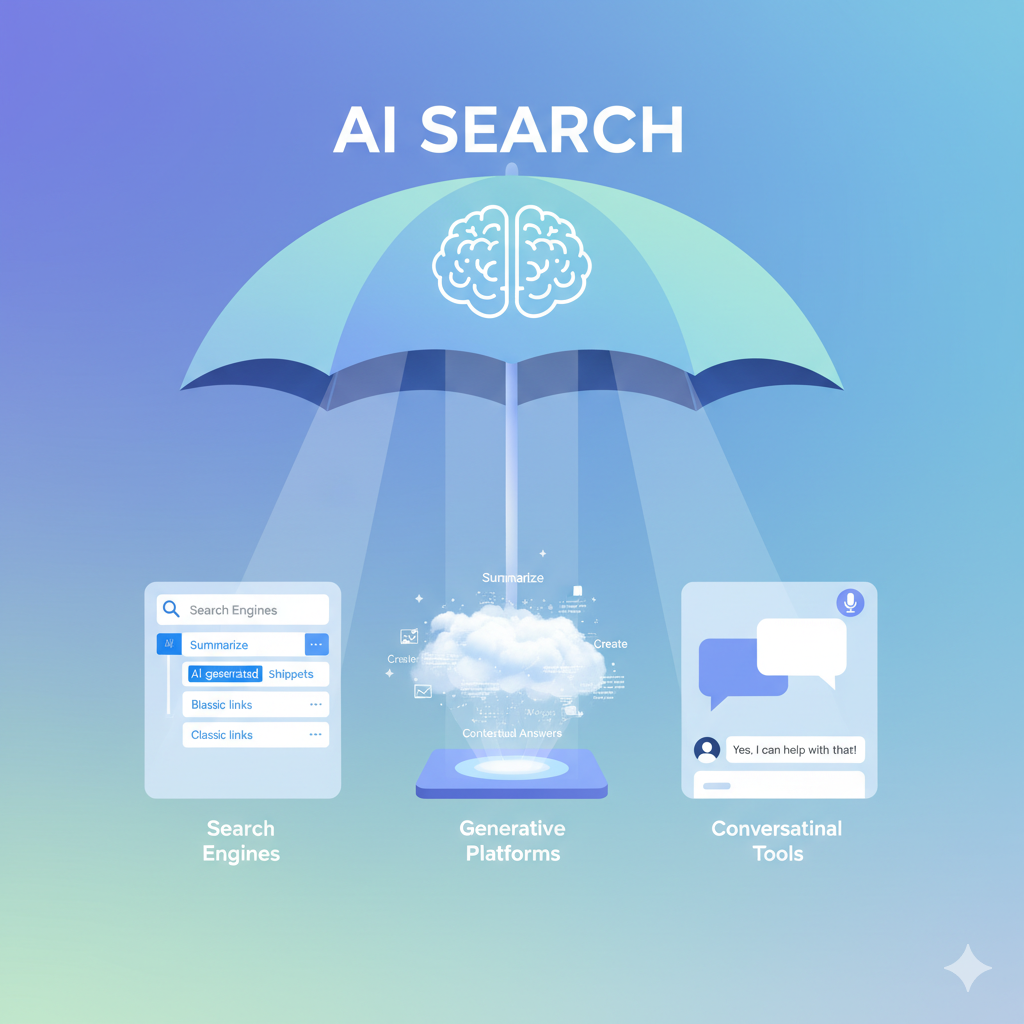Whether You Call It GEO or AEO — It’s All AI Search
AI Search is not just another buzzword. It represents one of the biggest shifts in how people find, evaluate, and act on information. While many assume AI Search simply means AI driven search, the reality is more complex and much more important for how businesses show up to their audiences. This article explores what AI Search really means, why it matters, and how businesses can prepare to be discovered in an AI powered world.
Recently, we ran a poll asking:
What is your go to term for search driven by AI?
Most people chose the expected answer: AI Search.
But the other responses reveal something bigger. AI Search is confusing because it does not have one clear definition. The space is evolving quickly. What started as Answer Engine Optimization (AEO), then shifted to Generative Engine Optimization (GEO), has now become AI Search.
AI Search is the umbrella that captures how search itself is being reshaped by artificial intelligence.
Breaking Down the Acronyms
What is GEO (Generative Engine Optimization)?
Generative Engine Optimization is about preparing content for AI platforms like ChatGPT, Perplexity, and Claude. These platforms do not return a list of links. They generate answers.
GEO means making sure your content is high quality, clear, and structured so that it can be referenced and included in these generative responses. Businesses that ignore GEO risk being invisible in tools where millions of people are now searching.
What is AEO (Answer Engine Optimization)?
Answer Engine Optimization applies to traditional search engines, especially Google and Bing. Increasingly, users are receiving answers directly on the results page, often without clicking through to a website.
AEO is about becoming the answer that appears in those direct responses. This means structuring content with clarity, authority, and precision so that it can surface in featured snippets, AI generated summaries, and knowledge panels.
What is LLMAO (Large Language Machine Model Answer Optimization)?
LLMAO started as a joke, but it highlights something real. Large Language Models (LLMs) are pulling, structuring, and synthesizing content to provide answers.
If your content is not clear, authoritative, and optimized, LLMs may misinterpret or ignore it. LLMAO is about creating content that LLMs can easily understand and reuse when generating answers for users.
What AI Search Really Means
AI Search is not a single tactic.
It is the full ecosystem of how people search today:
Search engines layering in AI generated results alongside traditional rankings (Google, Bing)
Generative platforms creating contextual answers on the fly (ChatGPT, Perplexity, Gemini)
Conversational tools where people ask questions in natural language and expect immediate responses (Chatbots, Voice Assistants)
AI Search represents the shift from keyword matching to intent matching. It prioritizes answers over links and discovery across platforms. To succeed, businesses must build content strategies that are discoverable not only by traditional search engines but also by generative AI models and conversational agents.
Why This Matters
If you are only optimizing for one area of search, you are missing others. Customers do not move in a straight line anymore. They might start with a Google search, shift into Perplexity for deeper research, and validate their findings in ChatGPT. Each of these touchpoints is a moment where your brand can either appear or disappear.
Optimizing for AI Search requires a new approach. It is no longer just SEO. It is building a strategy that works across search engines, generative AI platforms, and conversational tools. Those who adapt will gain visibility, while those who do not will fade into the background.
The Future of Search
AI Search is not a passing trend. It is the next evolution of how information is discovered. As AI becomes part of everyday life, businesses need to reimagine discoverability. It is no longer about fighting for clicks, it is about being the trusted answer no matter where the question is asked. Brands that build with AI Search in mind will lead the way.
Continuing the Conversation
AI Search is still developing, and best practices are being written in real time. What is clear is that the brands experimenting now are the ones that will be ahead later.
If you are curious about how AI Search impacts your strategy, let us have a conversation. I would love to hear your perspective and explore how we can adapt to this new era of discovery together.


